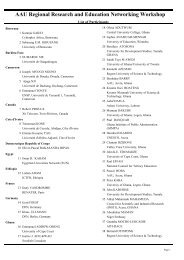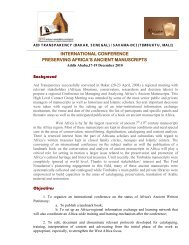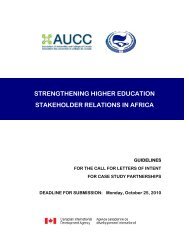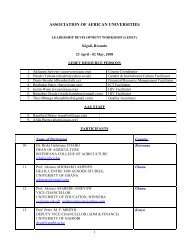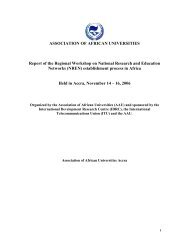Leadership Development Workshop (LEDEV) - Association of ...
Leadership Development Workshop (LEDEV) - Association of ...
Leadership Development Workshop (LEDEV) - Association of ...
Create successful ePaper yourself
Turn your PDF publications into a flip-book with our unique Google optimized e-Paper software.
ASSOCIATION OF AFRICAN UNIVERSITIES<br />
<strong>Leadership</strong> <strong>Development</strong> <strong>Workshop</strong> (<strong>LEDEV</strong>)<br />
Kigali, Rwanda<br />
April 23 – May 2, 2008<br />
Report<br />
INTRODUCTION<br />
The second AAU <strong>Leadership</strong> <strong>Development</strong> <strong>Workshop</strong> (<strong>LEDEV</strong>) was held at Hotel des<br />
Mille Collines in Kigali, Rwanda, April 23 – May 2, 2008. The event, hosted by The Kigali<br />
Institute <strong>of</strong> Science and Technology (KIST), brought together 27 participants made up <strong>of</strong> 2<br />
Vice-Chancellors, 3 Deputy Vice-Chancellors, an Executive Director <strong>of</strong> a National Council<br />
on Higher Education and 21 other senior academics and university managers from 7<br />
countries in Africa. Six <strong>of</strong> the participants were women. (See Attachment 1 for the List <strong>of</strong><br />
Participants)<br />
The workshop was funded principally under the AAU Capacity <strong>Development</strong> Project for<br />
the Revitalisation <strong>of</strong> African Higher Education Institutions (AAU-CADRE) financed by the<br />
African Capacity Building Foundation (ACBF), with a supplementary grant <strong>of</strong> US$9,540<br />
from the Swedish International <strong>Development</strong> Agency (SIDA), Lusaka. Since most<br />
participants, being from AAU member institutions in good standing, enjoyed a fee-waiver,<br />
registration fees collected amounted to US$950.<br />
BACKGROUND<br />
The AAU <strong>Leadership</strong> <strong>Development</strong> <strong>Workshop</strong> follows the <strong>Association</strong>’s Senior University<br />
Management <strong>Workshop</strong>s (SUMA), which were organised between 1991 and 2002 and<br />
whose review in 2003 resulted in its differentiation into leadership development and<br />
management training. These are currently run as separate programmes, namely, <strong>LEDEV</strong><br />
and a new Management <strong>Development</strong> <strong>Workshop</strong> (MADEV).<br />
Like SUMA, participation in <strong>LEDEV</strong> is drawn from the leadership <strong>of</strong> Africa’s higher<br />
education, with a particular focus on newly appointed Rectors, Vice-Chancellors, Deputy<br />
Vice-Chancellors <strong>of</strong> public and private institutions, University Council members, as well as<br />
heads <strong>of</strong> national and regional higher education regulatory agencies.<br />
OBJECTIVES OF <strong>LEDEV</strong><br />
<strong>LEDEV</strong> aims to enhance the leadership skills <strong>of</strong> university leaders, particularly in the<br />
promotion <strong>of</strong> innovation and the management <strong>of</strong> change, two essential features <strong>of</strong> African<br />
higher education in the 21 st century.<br />
WORKSHOP<br />
Thrust and Method<br />
The workshop was conducted over 8 working days during the period April 23 – May 2,<br />
2008.<br />
1
Pr<strong>of</strong>. Silas Lwakabamba, Rector <strong>of</strong> the National University <strong>of</strong> Rwanda gave the Keynote<br />
Address at the Opening Ceremony, which was chaired by Pr<strong>of</strong>. Chrysologue Karangwa,<br />
Rector <strong>of</strong> KIST, on Wednesday April 23, 2008. Pr<strong>of</strong>. Lwakabamba’s address is presented<br />
as Attachment 2. This was followed the course introduction, in which the Course Director<br />
set out the objectives, structure and approach <strong>of</strong> <strong>LEDEV</strong>. Participants then introduced<br />
themselves, each saying a few words about himself/herself and their institutions.<br />
The rest <strong>of</strong> the workshop was devoted to intensive interaction on the various themes as<br />
outlined in the programme (Attachment 3). The workshop focused on 6 modules, namely:<br />
• Institutional Culture, Gender and Change<br />
• Quality Assurance<br />
• ICT and Research and Education Networking<br />
• University <strong>Leadership</strong> and the Fight against HIV/AIDS<br />
• Financial Management: Resource Mobilisation and Allocation; Financial Analysis,<br />
Reporting and Performance Monitoring<br />
• Theory to Practice<br />
These were discussed and deliberated upon through intensive participant interaction over<br />
carefully selected case and other material, with lead lectures and group work, in a process<br />
facilitated by Resource Persons. In advance <strong>of</strong> the workshop, pre-workshop exercises had<br />
been given to participants, which involved a set <strong>of</strong> background issues and the key policy<br />
and management challenges facing African higher education, and the role <strong>of</strong> institutional<br />
leaders in meeting them.<br />
During the final module, “From Theory to Action”, participants were encouraged to reflect<br />
on the lessons <strong>of</strong> the previous 8 days and, on that basis, select a set <strong>of</strong> measures which fell<br />
within their mandate at their home institutions, and which they could introduce/implement<br />
on their return. The idea was that, within six months each participant was to share with the<br />
AAU and their colleagues a report on progress with their commitments. Presentations <strong>of</strong><br />
three selected participant proposals to the whole group formed the basis for a thorough<br />
exploration <strong>of</strong> how to construct realistic and actionable proposals. The presenters received<br />
constructive comments on their proposals.<br />
The Closing Ceremony was addressed by Mr. Romain Murenzi, Minister <strong>of</strong> Science,<br />
Technology, Research and ICT, in the Office <strong>of</strong> the President, Rwanda.<br />
Facilitation<br />
The workshop modules were facilitated by the following:<br />
• Dr. Boubakar Barry (Coordinator, AAU Research and Education Network Unit) – ICT<br />
• Mr. Denis Bérubé (Vice-President for Administration and Business Enterprises, Simon<br />
Fraser University, Vancouver, Canada) – Financial Management;<br />
• Theo Bhengu (Director, Accreditation, Council on Higher Education (CHE), Pretoria,<br />
South Africa) – Quality Assurance;<br />
• André Musemakweri (President <strong>of</strong> the Ligue Universitaire de Lutte Contre le Sida,<br />
National University <strong>of</strong> Rwanda, Butare, Rwanda) – HIV & AIDS;<br />
• Pr<strong>of</strong>. Barnabas Otaala (Pr<strong>of</strong>essor, Uganda Martyrs University, Uganda) – HIV &<br />
AIDS;<br />
• Dr. Dzodzi Tsikata (Lecturer and Researcher, Institute <strong>of</strong> Statistical, Social and<br />
Economic Research, University <strong>of</strong> Ghana) – Gender, Institutional Culture and<br />
Change in African Universities;<br />
2
• Dr. Justin Wane (HIV/AIDS Project Officer, AAU) – HIV & AIDS; and<br />
• Pr<strong>of</strong>. Akilagpa Sawyerr (Secretary-General, AAU) – Theory to Action<br />
Course Direction<br />
• Pr<strong>of</strong>. Akilagpa Sawyerr (Secretary-General, AAU) – Course Director<br />
Administrative and Logistic Support<br />
• Ms. Alida Baeta, Executive Assistant to the Secretary-General, AAU<br />
• Mr. Ransford Bekoe, Assistant Project Officer, Office <strong>of</strong> the Secretary-General, AAU<br />
• Dr. Desiree Karangwa, Dean, Faculty <strong>of</strong> Science, KIST.<br />
Special Events<br />
Participants made use <strong>of</strong> a free afternoon to visit KIST the Genocide Memorial Centre in<br />
Kigali. The latter presented a harrowing reminder <strong>of</strong> the repercussions <strong>of</strong> conflict and war,<br />
and man’s inhumanity to man.<br />
Other special events included:<br />
o A Welcome Dinner hosted by KIST at Chez Robert in Kigali<br />
o An Awards Night held at Caiman, Kibagabaga in Kigali.<br />
PREPARATION FOR <strong>LEDEV</strong> 3<br />
Prior to <strong>LEDEV</strong> 2, a ‘Training <strong>of</strong> Trainers’ <strong>Workshop</strong> had been held for 4 Francophone<br />
Resource Persons at the same venue from the 21-25 April 2008. The workshop, which was<br />
conducted by Denis Bérubé, was on the use <strong>of</strong> cases as a teaching tool. As part <strong>of</strong> their<br />
programme, the participants stayed on to observe the mode <strong>of</strong> delivery during the first two<br />
modules <strong>of</strong> <strong>LEDEV</strong> 2. By the end <strong>of</strong> the training, each participant had written a case, which<br />
will be used as part <strong>of</strong> the Francophone <strong>LEDEV</strong> workshop.<br />
CONCLUSION<br />
<strong>LEDEV</strong> 2 was very successful in terms <strong>of</strong> deepening awareness <strong>of</strong> the themes presented<br />
and the possible approaches to addressing the challenges that were identified. It also<br />
facilitated cooperation among the participants with the hope that this would encourage<br />
further networking and collaboration.<br />
Participants gave the workshop a very positive evaluation, which is summarised at<br />
Attachment 4.<br />
Akilagpa Sawyerr<br />
(COURSE DIRECTOR)<br />
3
ASSOCIATION OF AFRICAN UNIVERSITIES<br />
LEADERSHIP DEVELOPMENT WORKSHOP (<strong>LEDEV</strong>)<br />
Kigali, Rwanda<br />
23 April - 02 May, 2008<br />
PARTICIPANTS<br />
Attachment 1<br />
Name <strong>of</strong> Participant Country<br />
1. Dr. Ricks Galetsene CHABO<br />
Dean Of Agriculture<br />
Botswana College Of Agriculture<br />
rchabo@bca.bw<br />
2. Pr<strong>of</strong>. Akosua ADOMAKO AMPOFO<br />
Head, Centre For Gender Studies,<br />
University Of Ghana<br />
adomako@gmail.com<br />
3. Pr<strong>of</strong>. Akwasi ASABERE-AMEYAW<br />
Vice Chancellor<br />
University Of Education, Winneba<br />
vc@uew.edu.gh, asabereameyaw@yahoo.com<br />
4. Pr<strong>of</strong>. Peter .M. F. MBITHI<br />
Deputy Vice-Chancellor (Admin & Finance)<br />
University Of Nairobi<br />
dvcaf@uonbi.ac.ke<br />
5. Pr<strong>of</strong>. Gabriel N. MAGOMA<br />
Director, Academic Programmes, Karen Campus<br />
Jomo Kenyatta University Of Agriculture And Technology<br />
6. Pr<strong>of</strong>. Catherine W. MUTHURI<br />
Head Of Botany Department<br />
Jomo Kenyatta University Of Agriculture And Technology<br />
cmuthuri@fsc.jkuat.ac.ke<br />
7. Dr. Isaac Ipara ODEO<br />
Director<br />
Masinde Muliro University Of Sci & Tech<br />
iparaodeo@yahoo.com<br />
8. Pr<strong>of</strong>. Asenath J. SIGOT<br />
Deputy Vice-Chancellor<br />
Masinde Muliro University Of Sci & Tech<br />
Botswana<br />
Ghana<br />
Ghana<br />
Kenya<br />
Kenya<br />
Kenya<br />
Kenya<br />
Kenya<br />
4
Name <strong>of</strong> Participant Country<br />
sigot@africaonline.co.ke<br />
9. Dr. Gituro WAINAINA<br />
Business <strong>Development</strong> Manager<br />
University Of Nairobi Enterprises And Services Limited<br />
wainainagituro@yahoo.com<br />
10. Pr<strong>of</strong>. B. C. C. WANGILA<br />
Vice-Chancellor<br />
Masinde Muliro University Of Sci & Tech<br />
vc@mmust.ac.ke<br />
11. Ms. N. A. M. FANANA<br />
Dean, Faculty Of Law<br />
National University Of Lesotho<br />
nam.fanana@nul.ls<br />
12. Mr. Magnus KIRORI<br />
National University Of Rwanda<br />
mkirori@nur.ac.rw<br />
13. Dr. Aloys RUZIBIZA<br />
NATIONAL UNIVERSITY OF RWANDA<br />
aruzibiza@nur.ac.rw<br />
14. Dr. Herman MUSAHARA<br />
Dean, Faculty Of Economics And Management<br />
National University Of Rwanda<br />
hmusahara@nur.ac.rw<br />
15. Dr. Nurdin Kassim MUSHULE<br />
Director Of Research, Publications And Consultancy<br />
Kigali Institute Of Science And Technology<br />
drpc@kist.ac.rw<br />
16. Dr. Antonia MUTORO<br />
Director, Academic Quality<br />
Kigali Institute Of Science And Technology<br />
dq@kist.ac.rw,antoniamutoro@yahoo.com<br />
17. Ms. Coletha Uwineza RUHAMYA<br />
Vice Dean<br />
Kigali Institute Of Science & Technology<br />
coletharuhamya@yahoo.co.uk<br />
Kenya<br />
Kenya<br />
Lesotho<br />
Rwanda<br />
Rwanda<br />
Rwanda<br />
Rwanda<br />
Rwanda<br />
Rwanda<br />
18. Dr. Jean Damascene GATABAZI<br />
Lecturer, Dean Of Faculty<br />
Kigali Institute Of Science & Technology<br />
dgatabazi@yahoo.com<br />
Rwanda<br />
19. Dr Desire KARANGWA Rwanda<br />
5
Name <strong>of</strong> Participant Country<br />
Dean, Faculty Of Science<br />
Kigali Institute Of Science & Technology<br />
dkarangwa2003@yahoo.com<br />
20. Ms. Florence KANEZA<br />
Director, Academic Affairs/ Registrar<br />
Kigali Institute Of Science & Technology<br />
Registrar@Kist.Ac.Rw<br />
21. Ms. Susan MUTONI<br />
Director Of Planning And <strong>Development</strong><br />
National University Of Rwanda<br />
22. Mr. Francois NARAMABUYE,<br />
Director, Centre For Environment, Entrepreneurship, And<br />
Sustainable <strong>Development</strong><br />
National University Of Rwanda<br />
23. Mr. Jean Baptiste RUSINE<br />
Director, Kist Language Centre<br />
Kigali Institute Of Science And Technology<br />
j.rusine@kist.ac.rw<br />
24. Mr. Celestin KABAHIZI<br />
Vice Rector (Admin & Finance)<br />
Kigali Institute Of Education<br />
25. Mr. Marcellin MWUNVANEZA<br />
Director Of Finance<br />
Kigali Health Institute<br />
26. Pr<strong>of</strong>. A.B.K. KASOZI<br />
Executive Director<br />
National Council For Higher Education<br />
abkkasozi@yahoo.com<br />
27. Mr. Edward Ilangalibalele DHLAMINI<br />
Bursar/Head Of Finance<br />
University Of Zimbabwe<br />
edhlamini@yahoo.co.uk<br />
RESOURCE PERSONS<br />
Rwanda<br />
Rwanda<br />
Rwanda<br />
Rwanda<br />
Rwanda<br />
Rwanda<br />
Uganda<br />
Zimbabwe<br />
28. Akilagpa Sawyerr (asawyerr@aau.org) Theory to Action<br />
29. Dzodzi Tsikata (dzodzit@yahoo.co.uk) Gender & Institutional Culture<br />
30. Denis Berube (dberube@sfu.ca) Financial/Resource Management<br />
31. Boubakar Barry (barry@aau.org) ICT<br />
32. Justin Wane (jwane@aau.org)<br />
HIV<br />
6
33. Barnabas Otaala (otaala.barnabas@gmail.com) HIV<br />
34. Theo Bhengu (theophilus8@gmail.com) Quality Assurance<br />
AAU STAFF<br />
35. Ransford Bekoe (ransford@aau.org) Assistant Project Officer<br />
36. Alida Baeta (abaeta@aau.org) Executive Secretary<br />
7
ASSOCIATION OF AFRICAN UNIVERSITIES<br />
<strong>Leadership</strong> <strong>Development</strong> <strong>Workshop</strong> (<strong>LEDEV</strong>)<br />
Kigali, Rwanda<br />
23 April - 02 May, 2008<br />
Keynote Speech<br />
by<br />
Pr<strong>of</strong>. Silas Lwakabamba,<br />
Rector, National University <strong>of</strong> Rwanda<br />
Honourable Secretary General <strong>of</strong> the <strong>Association</strong> <strong>of</strong> African Universities<br />
Attachment 2<br />
Your Excellencies Ambassadors and Representatives <strong>of</strong> International Organisations……<br />
Rectors, Vice Chancellors, Deputy Rectors/ Vice Chancellors, Deans, Directors, and other<br />
Senior University <strong>of</strong>ficials<br />
Distinguished Guests<br />
Ladies and Gentlemen<br />
Honourable Secretary General, I would like to thank you for inviting me to share ideas on<br />
<strong>Leadership</strong> with this important <strong>Workshop</strong>. I feel honoured and a bit humbled by the<br />
challenge. I can’t tell you what leadership is, or how to do it. I would not claim to be a<br />
great leader. For me I just do the job that is in front <strong>of</strong> me as well as I am able to.<br />
However, I do seem to have been doing it in Rwanda and elsewhere for some time now. So<br />
it may be relevant to tell you how I have been going about it.<br />
For those who do not know me, I am the Rector <strong>of</strong> the National University <strong>of</strong> Rwanda,<br />
which is quite large by Rwandan standards. We take in about half <strong>of</strong> the public-sector<br />
students in the country, over eight thousand <strong>of</strong> them. Some <strong>of</strong> our Faculties and even<br />
Departments are larger than many other entire Rwandan higher education institutions. I<br />
lead the University.<br />
Ladies and Gentlemen: What I have been asked to talk about today is to introduce this<br />
workshop on what leadership is all about. I don’t want to talk about ‘being a leader’ – that<br />
is being in a prestigious position. It means standing at the top. Rather, I want to talk about<br />
leading – what it means to take the lead, what is entailed in leading a group or an<br />
institution. I want to rehearse some fairly obvious ideas, so that we can remind ourselves<br />
about them and they will remain in our minds in later discussions.<br />
Ladies and Gentlemen: First <strong>of</strong> all, what I mean by ‘leadership’ is a set <strong>of</strong> attitudes and<br />
practices – a way <strong>of</strong> working with people and a way <strong>of</strong> looking at what it means to work<br />
8
effectively in an institution. My examples will be from education. But I believe the same<br />
points hold for all kinds <strong>of</strong> leadership in all kinds <strong>of</strong> institutions.<br />
Secondly what I am also going to say is that leadership is not about taking command. It is<br />
about everybody taking responsibility. It is about building and sharing a consensus. It is<br />
about trusting colleagues and finding ways for everyone to grow together.<br />
By taking responsibility I mean being prepared to make decisions. Even among the<br />
students we graduate, a good honours graduate is someone who doesn’t have to wait to be<br />
told what to do. He or she has the confidence, and the knowledge and skills, to get on and<br />
do things for themselves. In the same way, our staff lead the students, and our Heads <strong>of</strong><br />
Departments and Deans lead the staff. This does not mean that they just pass on the orders<br />
but they take responsibility for students, for staff, and make sure that things work smoothly<br />
at their level. <strong>Leadership</strong> is not something that occurs just at the top. There is leadership at<br />
all levels. However, the Rector or Vice Chancellor is ultimately responsible for the<br />
University. ‘The buck stops here’, as an American President used to say. And it is up to the<br />
Rector or Vice Chancellor to ensure that the University is working smoothly and ‘going<br />
somewhere’.<br />
Ladies and Gentlemen: This notion <strong>of</strong> ‘going somewhere’ is central to my idea <strong>of</strong> what<br />
we have to do to lead effectively. Innovation and change are central to the concept <strong>of</strong><br />
leadership. If all you are doing is reproducing last year’s pattern <strong>of</strong> work, you don’t need a<br />
leader. People are perfectly capable <strong>of</strong> doing this by themselves. However, the institution,<br />
which is not changing in a positive sense, is dying. Institutions which do not adapt to<br />
changes in the world, and even make changes in the world, quickly become irrelevant and<br />
lose their place and their purpose. In Higher Education in Rwanda we are going through a<br />
particularly vicious and determined cycle <strong>of</strong> change at the moment, as we try to ensure that<br />
our graduates become as good as anybody’s, from anywhere in the world. This has meant<br />
that our leaders at all levels have had to work hard, convincing those they lead to adopt, not<br />
just new paperwork and a new way <strong>of</strong> working, but a new vision <strong>of</strong> what the University is<br />
all about. We have worked hard during the time since I have been at the National<br />
University <strong>of</strong> Rwanda, on agreeing our vision, our mission, and our strategic plan for the<br />
next five years, and everyone in the University owns all <strong>of</strong> these key conceptual<br />
frameworks.<br />
Ladies and Gentlemen: An institution is defined by its vision <strong>of</strong> itself. And so leadership<br />
is about building and sharing a vision. Institutions and their staff have to know what they<br />
are, in order to know where they are going and what they can become. You lead an<br />
institution – or a Faculty, or a Department, or a class, or any working group – ultimately by<br />
consensus. You get agreement as to what the institution or group is, how it wants to see<br />
itself, and from this follows what it wants to be in the future. It does have to be a consensus<br />
exercise, but it has to start somewhere, and the person who leads is the person who is able<br />
to formulate the vision and bring about that consensus. If you like, an institution or group<br />
or company has an ideology which defines what it is and what it has become. Leading is<br />
about embodying that ideology but also about shaping it. It is also about destroying false<br />
ideologies – the dull visions that say that we cannot change, that we cannot become better,<br />
that some things are beyond our achievement.<br />
Ladies and Gentlemen: Leaders do not just create consensus; they also embody what<br />
consensus produces, and the agreed vision may not be quite what the leader envisaged it<br />
would be. Leaders are not always right. Leading is about identifying problems and<br />
proposing the right solutions. However, the existence <strong>of</strong> the problems has to be agreed by<br />
9
everyone and the nature <strong>of</strong> the problem <strong>of</strong>ten changes as you talk to others about it - and<br />
others may be able to propose different solutions by seeing the problem rather differently.<br />
Leaders lead, but they have also to be flexible and to be led by others with a clearer<br />
perception or a better solution.<br />
So, <strong>Leadership</strong> is about taking responsibility and making decisions, but not by yourself –<br />
leading is a group process. It is about helping the institution or company or group to<br />
develop – to adapt to changes, and to grow organically to become what it wants to become<br />
and what it knows it can become. Leaders see things differently and help other people to<br />
see things differently. This means it is not just about decisions taken or even systems set in<br />
place. It is about how people see themselves and their group, and how they see the world in<br />
which it is set. <strong>Leadership</strong> is about agreeing values and determining a mission. It is about<br />
giving oneself and the others a direction in which to progress. The Leader manages minds,<br />
not just actions. He or she helps people see what they can be, in the institutional context,<br />
and what they are capable <strong>of</strong> doing.<br />
Further, leaders do not work by themselves. They have to have colleagues and to trust these<br />
colleagues. Ladies and Gentlemen, I am credited in this country with building the Kigali<br />
Institute <strong>of</strong> Science and Technology (KIST) from nothing to a very successful institution.<br />
This was indeed the outcome, but it’s not at all what I did – certainly not all by myself.<br />
What I did at KIST was to set up a very good team <strong>of</strong> senior managers – including one who<br />
is now a Minister and, later, another who now heads the National Council for Higher<br />
Education here in Rwanda – and we worked together to build an institution that worked and<br />
was going somewhere. Now that I am at the National University <strong>of</strong> Rwanda I am lucky to<br />
have been given a team around me that has a lot <strong>of</strong> experience <strong>of</strong> managing education<br />
institutions, and we work together, and together with our very experienced staff, to decide<br />
how the University can do its business better and what it should become in the short- and in<br />
the long-term. The Vice Rectors in their turn work with Deans and Directors, and the<br />
Deans work with programme leaders, and the programme leaders work with lecturers and<br />
students. At all levels, leadership is ‘working with’ to achieve our aims together.<br />
So I would stress that leadership is not just something done by Leaders –that is by the<br />
people who stand formally or informally on the top <strong>of</strong> the pyramid. Everyone who works<br />
with other people can and should exercise some degree <strong>of</strong> leadership. Everyone needs to<br />
take responsibility, to take ownership for what their group is doing and where it is going.<br />
Everyone needs to build a consensus and a trust with working colleagues. <strong>Leadership</strong>, in<br />
one sense, is what binds people together into functional units. It is how people work<br />
together to become more than isolated individuals. It is taking responsibility for each other.<br />
It is about agreeing common goals and forging a common determination to see them<br />
achieved. It is having respect for each other and making sure that everyone is in a position<br />
to contribute what they do best.<br />
Ladies and Gentlemen: What leadership is not is management. Managers do lead, and<br />
leaders do have to manage; <strong>of</strong> course things have to get done. Management, however, is<br />
doing it yourself and deciding how it shall be done. <strong>Leadership</strong> is about letting other people<br />
do it, giving them the freedom to develop the future, within the common space <strong>of</strong> purpose,<br />
which you and they have created, under your coordination. Micro-management is the<br />
enemy <strong>of</strong> leadership. It takes away people’s ability to do their job and make their<br />
contribution to the common goal to the best <strong>of</strong> their ability, and substitutes the will <strong>of</strong> one<br />
person and one person’s working methods. Leaders, paradoxically, have to be able to stand<br />
back and let others get on with the work.<br />
10
This is because leadership has worked effectively only when people freely agree to work<br />
together in an effective manner. When you are bringing up children, you can tell them what<br />
to do and how to remain safe, but you cannot tell them how to grow up into the sort <strong>of</strong><br />
people who can take decisions and themselves take on the role <strong>of</strong> leader. We can give our<br />
students knowledge and give them skills, but becoming the kinds <strong>of</strong> people who can use the<br />
knowledge and skills – potential and actual leaders – is something they have to do for<br />
themselves, with our help. In the same way, you cannot build an effective institution just by<br />
managing it. What you have to do is to ensure that your all agree on what is going on and<br />
where you want to go. You have to be sure that the procedures are adequate and the<br />
resources are sufficient to achieve the goals you all want to achieve. Then you absolutely<br />
must let them get on and do it. They in their turn don’t just tell people what to do; they<br />
share a view <strong>of</strong> what needs to be done, and they are successful when the people they lead<br />
take on that vision and apply it themselves. And so on down the chain.<br />
Ladies and Gentlemen: I don’t think I’ve really told you what leadership is or how to be a<br />
leader. But I have given you my own strong views on what leadership is and is not. I hope<br />
that you will find this interesting, and perhaps even useful.<br />
I thank you again for listening to me and I wish you the best during the week <strong>of</strong> your stay<br />
here.<br />
11
ASSOCIATION OF AFRICAN UNIVERSITIES<br />
<strong>Leadership</strong> <strong>Development</strong> <strong>Workshop</strong> (<strong>LEDEV</strong>)<br />
Draft Programme<br />
Kigali, Rwanda<br />
23 April - 02 May, 2008<br />
Tues April 22 Arrivals and Registration<br />
Wed April 23<br />
08.30 – 09.00 Arrivals and Registration<br />
09.00 – 10.00 OPENING CEREMONY<br />
10.00 – 10.30 Group Photograph/C<strong>of</strong>fee Break<br />
Attachment 3<br />
10.30 – 11.30 Course Introduction & Orientation (Sawyerr)<br />
11.30 – 13.00<br />
MODULE I: Institutional Culture, Gender and<br />
Change<br />
Session 1: Institutional Culture, Gender and<br />
Change<br />
14.00 – 17.00 Session 2: Institutional Culture, Gender and<br />
Change<br />
EVENING Welcome Dinner – CHEZ ROBERT, KIGALI<br />
Thurs April 24<br />
08.30 – 10.30 Session 3: Institutional Culture, Gender and<br />
Change<br />
MODULE II: Financial Planning and Budgeting<br />
11.00 – 13.00 Session 1: Financial Planning and Budgeting<br />
14.00 - 18.00 Session 2: Revenue Diversification and Cost<br />
Recovery<br />
Fri April 25<br />
08.30 – 13.00 Session 3: Resource Allocation<br />
MODULE III: ICT & Research and Education<br />
Network<br />
14.00 - 18.00 Session 1: ICT & Research and Education Network<br />
(Tsikata)<br />
(Berube)<br />
(Barry)<br />
12
Sat April 26<br />
08.30 - 13.00 Session 2: ICT & Research and Education Network<br />
14.00 - 17.30 FREE AFTERNOON<br />
EVENING ENTERTAINMENT<br />
Mon April 28<br />
08.30 – 10.30<br />
Session 3: ICT & Research and Education Network (Barry)<br />
11.00 - 13.00 MODULE IV: HIV & AIDS Response Management<br />
and Mitigation<br />
Session 1: The Role <strong>of</strong> <strong>Leadership</strong> in the fight<br />
against HIV/AIDS<br />
14.00 - 16.00 Session 2: The Role <strong>of</strong> <strong>Leadership</strong> in the fight<br />
against HIV/AIDS<br />
(Wane/<br />
Otaala/Owino)<br />
16.30 – 17.30 From Theory to Action (Sawyerr)<br />
Tues April 29<br />
08.30 – 13.00 Session 3: HIV & AIDS Response Management and<br />
Mitigation<br />
14.00 - 17.30 MODULE V: The Role <strong>of</strong> Institutional <strong>Leadership</strong><br />
in Quality Assurance<br />
Wed April 30<br />
Session 1: The Role <strong>of</strong> Institutional <strong>Leadership</strong> in<br />
Quality Assurance<br />
08.30 - 13.00 Session 2: The Role <strong>of</strong> Institutional <strong>Leadership</strong> in<br />
Quality Assurance<br />
14.00 - 17.30 VISIT TO KIST, GENOCIDE MEMORIAL CENTRE<br />
Thurs May 1<br />
08.30 - 10.30 Session 3: The Role <strong>of</strong> Institutional <strong>Leadership</strong> in<br />
Quality Assurance<br />
(Bhengu)<br />
11.00 - 13.00 COURSE CONCLUSION: From Theory to Action (Sawyerr)<br />
14.00 – 16.00 From Theory to Action<br />
EVENING: CLOSING DINNER AND AWARDS NIGHT<br />
Friday, May 2<br />
DEPARTURES<br />
Tea/C<strong>of</strong>fee Break (morning) 10.30 – 11.00<br />
Tea/C<strong>of</strong>fee Break (afternoon) 16.15 – 16.30<br />
Lunch 13.00 – 14.00<br />
13
ASSOCIATION OF AFRICAN UNIVERSITIES<br />
<strong>LEDEV</strong> II<br />
KIGALI, RWANDA<br />
23 April – 2 May, 2008<br />
Participants Evaluation <strong>of</strong> the Modules and Comments<br />
Attachment 4<br />
14
Score (%)<br />
100<br />
90<br />
80<br />
70<br />
60<br />
50<br />
40<br />
30<br />
20<br />
10<br />
0<br />
Materials<br />
clearly<br />
Presented<br />
Participants' Evaluation <strong>of</strong> <strong>LEDEV</strong> II Modules<br />
Units wellorganised<br />
Major issues<br />
discussed<br />
Instructor<br />
responded well<br />
Right balance<br />
<strong>of</strong> lectures and<br />
exercises<br />
Participants’<br />
ideas<br />
respected<br />
Right<br />
complexity <strong>of</strong><br />
materials<br />
G&IC 73 69 75 85 70 83 78<br />
FM 86 87 86 91 85 85 90<br />
ICT 90 85 86 94 84 91 91<br />
HIV 76 77 74 73 69 74 79<br />
QA 85 84 86 94<br />
Issues Evaluated<br />
85 85 83<br />
Key<br />
G&IC: Gender and Institutional Culture<br />
FM: Financial Management<br />
ICT: ICT and Research and Education Networks<br />
HIV: Human Immunodeficiency Virus<br />
QA: Quality Assurance<br />
15
The questionnaire on the ‘Theory to Action’ module was slightly different from those<br />
administered on the other five modules, and its graphic is presented below.<br />
o The topics were well selected.<br />
VIEWS OF PARTICIPANTS<br />
o The workshop was well organized and perfectly implemented. It is advised that future<br />
workshops should take into account specific areas and gather specialists from all the<br />
universities, for example, research topics related to agriculture, natural resource<br />
management, and African politics.<br />
o The mix <strong>of</strong> presentation from different parts <strong>of</strong> Africa and outside was good.<br />
o The workshop was good. Could be better if the time was more. The experience from<br />
Africa was very good and constructive.<br />
o Good facilitation – The Quality Assurance (QA) facilitator has a lot <strong>of</strong> experience.<br />
o There is so much to learn from South Africa (in terms <strong>of</strong> QA).<br />
o The ICT module was well done. However, in future module, consideration for inviting<br />
ICT decision makers would perhaps be useful.<br />
o The presenter on ‘Theory to Action’ has a lot <strong>of</strong> experience and we shall all benefit<br />
from it.<br />
o The module on ‘Theory to Action’ was a very thoughtful addition to the other modules.<br />
It provided an opportunity for the participants to internalize the modules and provide<br />
the way forward. Congratulations on this addition.<br />
16



